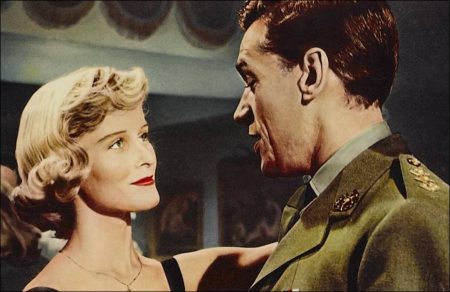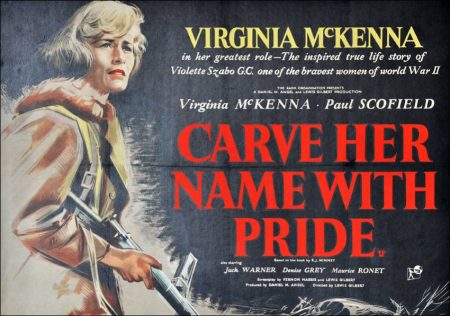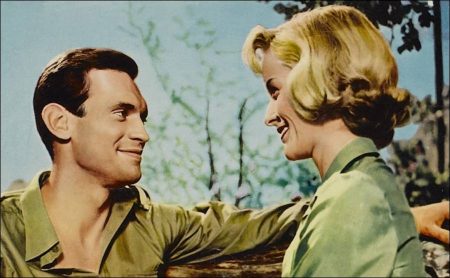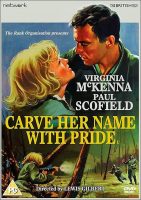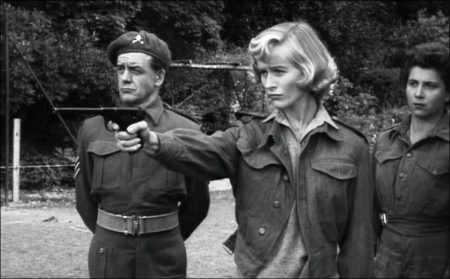
Taglines: The imperishable story of the BRAVEST woman who ever lived!
Carve Her Name with Pride movie storyline. Violette Bushell (Virginia McKenna) is the daughter of an English father and a French mother, living in London in the early years of World War II. She meets a handsome young French soldier in the park and takes him back for the family Bastille day celebrations. They fall in love, marry, and have a baby girl when Violette Szabo receives the dreaded telegram informing her of his death in North Africa. Shortly afterwards, Violette is approached to join the S.O.E. (Special Operations Executive). Should she stay and look after her baby or “do her duty”?
Carve Her Name with Pride is a 1958 British war drama film based on the book of the same name by R.J. Minney. The film, directed by Lewis Gilbert, is based on the true story of Special Operations Executive agent Violette Szabo, GC, who was captured and executed while serving in Nazi-occupied France. Szabo was played by Virginia McKenna. Supporting cast are Paul Scofield, Jack Warner, Charles Bushell, Denise Grey, Alain Saury, Maurice Ronet, Anne Leon, Sydney Tafler, Avice Landone, Nicole Stéphane and Noel Willman.
The poem, “The Life That I Have”, also known as “Yours”, recited to Violette by her husband Etienne, was once believed to have been written especially for the film, but was in fact the actual code poem given to her in March 1944 by the SOE cryptographer Leo Marks, and written by him on Christmas Eve 1943 in memory of his girlfriend, Ruth, who had recently died in a plane crash. Marks, who became a scriptwriter after the war, would only let the poem be used on condition that his authorship was not revealed.
The Real Violette Szabo
With her blonde hair and handsome angular features, Virginia McKenna bears no resemblance to the real Violette Szabo, a pretty if not ravishing brunette with dark eyes standing at less than 5 ft 5in tall. McKenna gives Szabo a marked south London accent brushed with received pronunciation, her performance being in the tradition of the “stiff upper lipped” strictly class-structured heroine that would be anticipated by audiences in the atmosphere of a pre-Bond 1950s Britain. The film itself, released in 1958, does not show the full horror of Szabo’s treatment in captivity, especially in Ravensbrück concentration camp, or the true manner of her execution, but it gives a broad impression of her bravery and fortitude.
Szabo was described in the citation to her posthumous George Cross as having shown a “magnificent example of courage and steadfastness”, by her daughter, Tania, in the title of her 2007 book about her mother’s missions, as “young, brave, and beautiful”, and by fellow SOE agent, Odette Sansom, GC, who survived Ravensbrück, as “the bravest of us all”.
Denise Bloch and Lilian Rolfe were fellow SOE agents, and were executed with Violette Szabo on 5 February 1945 in Ravensbrück. Colonel Maurice Buckmaster was head of SOE F Section; Vera Atkins was his assistant and the section’s intelligence officer, with special responsibility for female agents.
Vera Atkins, Odette Sansom, and Leslie Fernandez, one of Szabo’s SOE instructors and a field agent himself, were advisors on the film. The role played by Paul Scofield, Tony Fraser, was created for dramatic purposes, but is based upon Szabo’s actual male colleague on her missions to France, and organiser of the Salesman circuit, Philippe Liewer (‘Major Charles Staunton’).
Film Review for Carve Her Name with Pride
Anyone who has ever read a book on British film history will have noticed the authors invariably spend half of it banging on about films in the war and shortly after (Powell and Pressburger, etc) before skipping swiftly on to the 1960s. And sadly, Carve Her Name With Pride explains why this is. British austerity of the 1950s made for boring films despite the subject matter (spies and resistance): it manages to be dull, prim and proper.
The film is pre-Bond espionage, with the nobody plucked out of obscurity to fight the war behind enemy lines. Violette Szabo (Virginia McKenna) is an ordinary girl in wartime London, who has a whirlwind romance with a French Legionnaire who meets her while on R&R.
Not long after, she’s approached by British covert operations. It turns out her fluent French would be key in aiding the Resistance behind enemy lines. But what can she do, she says, she’s just a girl. It’s a tale of empowerment, but hardly a believable one for many. We see little evidence of it, but we are told she takes like a duck to water to rifle training, skydiving and the like.
But the training scenes sum up everything wrong with British cinema of the time. It all seems like a farce now: the would-be British spies train in knitted vests and shirts, and mutter: “Oh, what I’d give for a nice hot cup of tea” as they stumble over the assault course.
Sadly the action scenes hardly seems any more believable. What should be a taught and tense affair, as Violette tries to stay unnoticed in Rouen, is all rather polite; everyone, Nazis and all wonder around the ruins being very civilized to each other. Even the torture scenes seem quite pleasant, if such a thing is possible. It’s a very different kettle of fish from the realism of Melville’s Army of Shadows.
The film is typical of reservation of the time: her husband is soon killed in action, but everyone maintains a British stuff upper lip, camera included. When her mother comes to break the news to her, the telegram in hand, she closes the door behind her, leaving the camera and us outside in the corridor. No tears on display, by Jove.
Yet attractive women with her talents often played a different role in occupied territory than just passing on messages (massages, maybe). Is this a subtext implied in her flirting with the local Nazi CO? Either way, something so shocking for prudish audiences would never be made explicit. It’s a topic explored much more recently, and perhaps accurately, in Paul Verhoeven’s Black Book, when the protagonist is asked how far she is prepared to go to help the effort.
Despite its setting, Carve Her Name is like any other British melodrama of the 1950s, like an upper class, bland episode of Coronation Street, only set in Vichy, France. Yes, it was based on a true story, and Violette Szabo should be remembered, but it’s a pity the film honouring her had to be so unmemorable.
Carve Her Name with Pride (1958)
Directed by: Lewis Gilbert
Starring: Virginia McKenna, Paul Scofield, Jack Warner, Charles Bushell, Denise Grey, Alain Saury, Maurice Ronet, Anne Leon, Sydney Tafler, Avice Landone, Nicole Stéphane, Noel Willman
Screenplay by: R.J. Minney, Vernon Harris, Lewis Gilbert
Production Design by: Edward Joseph
Cinematography by: John Wilcox
Film Editing by: John Shirley
Costume Design by: Phyllis Dalton
Art Direction by: Bernard Robinson
Makeup Department: Ivy Emmerton, Bob Lawrance
Music by: William Alwyn
MPAA Rating: None.
Distributed by: Rank Organisation
Release Date: February 18, 1958
Views: 215
